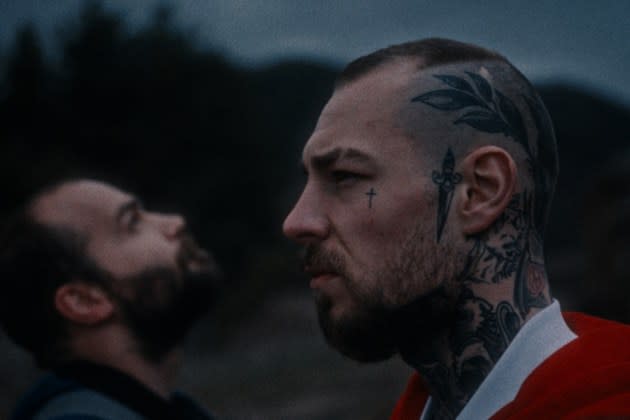‘Windless’ Review: A Powerfully Evocative Portrait of a Reluctant but Redemptive Homecoming

Our striking introduction to Kaloyan (Ognyan Pavlov) in Pavel G. Vesnakov’s potent and profound “Windless” is as an out-of-focus blur, smoking a cigarette in the foreground. Beyond him, trucks trundle down a highway, and bare trees throw their branches to the sky, while birds wheel and scatter against gray clouds. It is the first of many eerily considered compositions, hemmed in by an audaciously claustrophobic 1:1 aspect ratio, to tell almost the film’s entire story in miniature. Kaloyan is a man at odds with his surroundings — the Bulgarian village where he grew up and to which he has returned after a long, self-directed exile. It is as though the adult he has become is fighting for focus with the ghost of who he once was, the unhappy child who called these bleak, unwelcoming landscapes home. The past is always a foreign country, even if it’s the one you were born and raised in.
In his second feature after 2020’s well-received “German Lessons,” Vesnakov, abetted by some extraordinary shotmaking from DP Orlin Ruevski, has hit on a stylistic approach of such burningly poetic intensity that later scenes of a nighttime bonfire feel like inevitable catharsis — the pent-up energy of so much dense, exquisite, square-framed portraiture finally bursting into flame. It’s all the more remarkable for adorning a simple story told with eloquent economy, accented by the desolate, twanging guitar of Ascari’s Western-evoking score. Despite the input of five screenwriters (Vesnakov, Simeon Ventsislavov, Teodora Markova, Nevena Kertova and Georgi Ivanov) “Windless” is measured and quiet and anything but long-winded.
More from Variety
Pavlov, who plays the returnee Kaloyan, is a celebrated rap star named Fyre in his native Bulgaria, but here brilliantly embodies a taciturn character, whose silences and wordless responses are somehow more articulate than speech. Even the rapper’s own heavily tattooed body becomes a visceral visual metaphor for his character’s desire to erase, or at least overwrite his heritage, with his face, his neck, his hands and arms providing the canvas for a new, self-invented identity.
The body ink, including a Janus-like image of Julius Caesar covering the whole back of his shaven head, is also a red herring, projecting a tough-guy facade far removed from Kaloyan’s actual introversion. Then again, his mission here is hardly a joyful one: he has returned to arrange the sale of his recently deceased father’s house. But when carrying out some routine paperwork, he’s informed that there is more for him to do. As part of a drive to attract new investment to this economically backward part of the country, a complex comprising a golf course, spa and casino is in the early stages of construction, necessitating the bulldozing of the town’s cemetery. Not only will Kaloyan’s father’s remains be removed and reinterred, but those of his grandparents as well, and Kaloyan is the only relative on hand to make decisions about who will handle the reburial and how many plots the old bones should occupy. “Let the municipality do it, ” says Kaloyan brusquely to the peevish lady handing him forms and pamphlets, “Whatever. One grave.”
This ruthless lack of sentimentality continues as Kaloyan, aided by his mother via Zoom, goes about clearing out his dad’s old house. Furniture, ornaments and boxes of old photographs all meet the same response: “Throw them away.” When he finds some old toys, she briefly thaws: “Aww, your grandfather brought them all the way from the Soviet Union,” she reminisces, before adding, once again, “Throw them away.” But after he and a friend take on the task of helping other homeowners empty their requisitioned properties, the effort of all this summary disposal begins to take its toll on Kaloyan’s reserve, as do the many tales he hears from old friends and neighbors, of his locally legendary, larger-than-life father’s exploits — stories that are colored with all the warmth and admiration that Kaloyan found so lacking in his own troubled paternal relationship.
“Windless” does not deal in forgiveness, but it is about the beginnings of a tentative reconciliation between Kaloyan and the village he fled, the memories he suppressed and the father he “loathed.” Perhaps seeing his dad as the product of a tough-love generation who denied their offspring affection for fear of making them soft has helped. Perhaps it’s remembering overhearing his father’s heartbreakingly hard-headed advice to a friend: “Kiss your child only when they’re sleeping.” Or maybe it’s simply being back here, as ribbons of red-and-white hazard tape are stretched across the plundered cemetery and old lace curtains cast frilly patterns across Kaloyan’s tattooed face. To notice the callous way the young and the living deal with the old and the dead is to understand that the only way to break a community’s cycle of lovelessness and decline is to treat the previous generation, however belatedly, better than they treated you.
Best of Variety
Sign up for Variety’s Newsletter. For the latest news, follow us on Facebook, Twitter, and Instagram.

